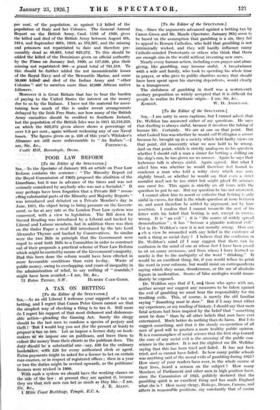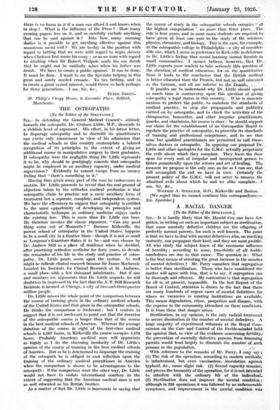[To the Editor of the SPECTATOR.]
am sorry to seem captious, but I cannot admit that Dr. Welldon has answered either of my questions. Ile says that duelling is always sinful, because it involves the taking of human life. Certainly. We are at one on that point. But what I asked him was whether he would call Wellington a sinner because he, brought up in a society which held faulty views on that point, did innocently what we now hold to be wrong. And on that point, which is strictly analogous to his question whether I should call a man a sinner for ,betting a shilling on the ship's run,-he has given me no answer. Again lie says that lecherous talk is always sinful. Again agreed. But what asked him. was whether he would therefore feel bound to condemn a man who told a witty story which was very slightly broad, or whether he would say that even a strict moralist need not be too strict but might plead. De minimis non carat lex. . This again is strictly on all fours with the question he put to me. But my question he has not answered.
I cannot allow him to assert ex cathedra that betting is only sinful in excess, for that is the whole question at issue between us, and must therefore be, settled by argument, not by bare assertion. I confess that I .cannot reconcile the rest of his letter. with his belief that betting is not, except in excess, wrong. It is an evil " ; it is " the source of widely spread demoralization " ; it has " become a gigantic national evil." Yet in Dr. Welldon's view it is not morally wrong. How can filch a view be reconciled with any belief in the existence of such a thing as social duty ? I believe that the confusion in Dr. Welldon's mind (if I may suggest that there can - be confusion in the mind of one at whose feet I have been proud to sit on many occasions, and from whom I have learned so Much) is due to the ambiguity of the word "drinking." It would be an excellent thing, Sir, if you would refuse to print the word in your columns, but would insist on correspondents saying which they mean, drunkenness, or the use of alcoholic liquors in moderation. Scores of false analogies would imme- diately be exposed.
Dr. Welldon says that if I, and those who agree with me, neither accept nor suggest any measures to be taken against the evil of gambling we must bear the responsibility for the resulting evils. This, of course, is merely the old familiar saying " Something must be done." But if I may trust either my experience, or my reading of history, I should say that more fatal actions had been inspired by the belief that " something must be done " than by all other beliefs that men have ever entertained. Much better do nothing than do harm. But I do suggest something, and that is the steady co-operation of all Men of ,good will to produce a more healthy public opinion. It is a commonplace of social science that the first step toward the cure of any social evil is the arousing of the public con Science in the matter. It is not the slightest use Dr. Welldoe saying that this has been tried and failed. It has not been tried, and so cannot have failed. In how many public schools was anything said of the moral evils of gambling during 1925 How many of your readers have ever, in the whole course of their lives, heard a sermon on the subject ? How many Members of Parliament and other men in high position have, since the Commission of 1923, publicly declared that the gambling spirit is an excellent thing and has made England. what she is ? How many clergy, Bishops, Deans, Canons, and others in responsible positions, say constantly tho of course
there is no harm in it if a man can afford it and knows when to stop ? What is the influence of the Press ? How many evening papers live on it, and so carefully exclude anything that can be said against it ? Into how many morning dailies is it possible to get anything effective against this monstrous social evil ? We are to-day in the position with regard to betting that we were with regard to negro slavery when Clarkson first wrote his essay ; or as we were with regard to drinking when Sir Robert Walpole made his son drunk that he might not be unfilially sober when his father was drunk. We have to create a public opinion. It can be done. It must be done. I want to see the Spectator helping in this great and sorely needed crusade. To tax betting, and so to create a great vested interest, would throw us back perhaps for three generations.—I am, Sir, &c.,
PETER GREEN.
St. Philip's Clergy House, 6 Encombe Place, Salford, Manchester.











































 Previous page
Previous page